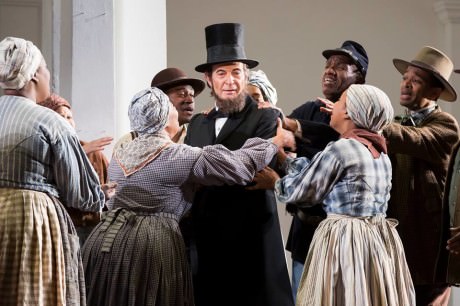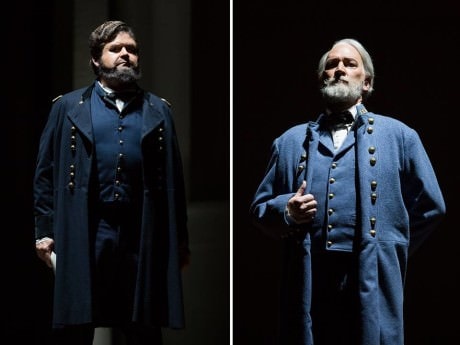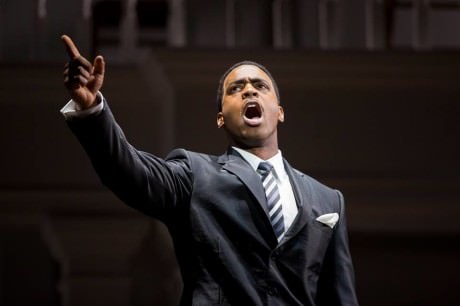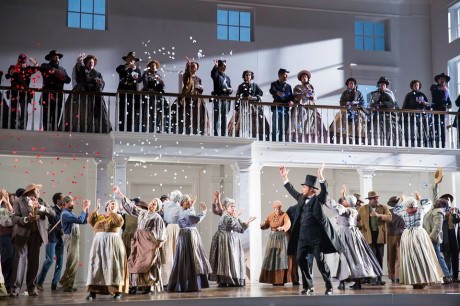Oh, the tears, trauma and travail of the issues brought to the fore in the revised World Premiere of the opera Appomattox at the Kennedy Center Opera House Friday night. This challenging World Premiere by renowned modern composer Philip Glass (the opera Einstein on the Beach and the film score of The Hours) and librettist Christopher Hampton (Academy Award winner for the film Dangerous Liaisons), originally premiered at the San Francisco Opera in 2007 but it has been considerably reworked to cut a much bolder swath through two seminal historical events (the original version focused primarily on Lee and Grant).

The minutiae of these two events –namely the signing of the Treaty to end the Civil War and the meeting between the Rev. Martin Luther King, Jr. and President Lyndon Baines Johnson to sign the historic Voting Rights Act –is forcefully delineated by Hampton’s economical writing but is given much more dramatic heft by emphasizing the broader, often polarizing tensions of the theme of Race in America.
Spanning the years 1865 to 1965, one wonders if anything has really changed in terms of Race relations in our country. To be specific, even the opera does not completely end at 1965, for there is a chilling coda where the unrepentant racist Edgar Ray Killen (who was indicted in 2005 for planning and directing the killing of three civil rights workers) espouses hatred in a scabrous reverie. Glass and Hampton are obviously making the case that the repercussions and reverberation of the fight for equality and voting rights goes on and -even -goes backwards (just read the recent news reports to see how the battle for voting rights continues). Indeed, the relevance of this opera is all too apparent.
The Washington National Opera Orchestra under the finely-shaded and firm directorial hand of Tazewell Thompson (and the overarching watchful eye of Artistic Director, Francesca Zambello), insistently urges its way into the collective consciousness of the heart and mind by sheer dint of the operatic motifs and patterns of Glass (Glass is a master at letting his musical orchestrations elucidate the text with subtle vigor), the literate finely-wrought Libretto by Hampton and the outstanding ensemble of singers who are firmly entrenched in their roles. History has never seemed less musty for there is a subtle power underlying the recitative text of these characters that reflects on large issues of history, the horror of war and some amusing moments of sly, quirky humor to express personality eccentricities.
Credit Glass for the depth on arrangements and orchestral melody underneath the patterned Glass style for as Glass said in a pre-show conversation: ‘There are fragments of Melody in the orchestra that do not need to be sung.” The lushness of these melodic arrangements are all too apparent and very welcome in the subtle almost basa-nova beat that accompanies Lyndon Johnson’s reading of his demands to Alabama’s Governor George Wallace and the cacophonous, rigorous arrangement that underscores the stridency of Edgar Ray Killen’s rantings. If you feel that this will be a predictable musical score from Glass, you are in for a surprise.
Conductor Dante Santiago Anzolini directs the Washington National Opera Orchestra with a proper emphasis on the strings and a feel for the Glass operatic arrangements that underscore and then, audaciously and suddenly, organically evolve into full-blown melody to amaze our ears. Each primary performer and supporting performer are required to handle dual roles and the vocal power of all is highly commendable with several performers standing out with close to “scene-stealing “ appeal. Credit the Directorial hand of Thompson once again for the ensemble feel of this show is truly cohesive in the long run and there is a highly disciplined feel to this Opera even though it covers such a broad and sprawling terrain of varied issues.
Overt credit must be given to Costume Designer Merrily Murray-Walsh and Hair and Makeup Designer Anne Ford–Coates for consummate believability as the cast jumps from one character to another with complete conviction.
The opera is indeed an evening of rich panoramic highlights and beautifully-lit tableau – credit Lighting Designer Robert Wierzel for capturing the almost sepia-tinged look of men singing around the campfire, the joy of Gospel singing at a Baptist Church and the appropriately somber mood of groups of forlorn women singing of the horrors of bloodshed and the loss of loved ones (shades of The Trojan Women). Feminist sympathies appear to be in full play here. All the female characters are portrayed with utter humanity and full self-realization.
Scenic Design by Donald Eastman is above the norm. A huge white edifice initially appears which works effectively as the Appomattox Court House, the Presidential Steamboat and the White House. Huge Confederate and American Flags drop swiftly from the top of the stage when needed.

It is 1865 and the meeting between General Robert E. Lee (Bass-baritone David Pittsinger) and General Ulysses S. Grant (baritone Richard Paul Fink) is a standout. The characters never feel like caricatures or reverential to a fault as they realize they must make amends for the bloody conflict that has torn the country apart. Pittsinger is a dream of a singer who expresses every nuance of a line with authority and natural yet authoritative ease. His aria preceding this scene-as he sings of having been willing to join the Union Army but not being able to because of his sense of honor as a native of Virginia is a standout. Pittsinger’s expressive voice brings out every nuance of his feelings.
The character of Julia Grant (Soprano Melody Moore) is eminently practical and full of common-sense and Moore brings this out beautifully. Moore’s purity and clarity of tone is crisp and pragmatic yet, concurrently, almost ethereally entrancing.
The scene between Abraham Lincoln (Baritone Tom Fox) and Frederick Douglass (Bass Soloman Howard) is appropriately awkward and unsettling as Lincoln expresses dismay and shock that Douglass had been denied initial entry to the White House. The continual slights of prejudice and bigotry are successfully incorporated throughout the Opera.
Playing the often – misunderstood and complex character of Mary Todd Lincoln (Soprano Anne-Carolyn Bird), Ms. Bird never makes the mistake of playing Todd Lincoln as a mentally unbalanced fanatic but, rather, hones in on making her character intuitive and receptive to omens and premonitions from her fervid dreams. Her premonition of a lonely boat trip to a foreign shore alone is an ominous foreshadowing of Lincoln’s assassination.
In this more literate — but still compelling – First Act (the Second Act is much more “over the top” and ambitiously written ), other captivating portrayals are delivered by Tenor Frederick Ballantine as journalist Morris Chester (Ballantine delivers the last line of Act One with chilling defiance) and Mezzo-Soprano Chrystal E. Williams works wonders with the role of Elizabeth Keckley.
As we enter Act Two, Flash forward 100 years to 1965 and the fight to get the Voting Rights Bill Passed. The Act opens with the magnificently-voiced Washington National Chorus ensemble bemoaning the tragic death of Jimmie Lee Jackson. From tears to a Gospel-tinged musical celebration of endurance and transcendence over the painful realities of time and place- once again, Glass shows the extreme variety of his composing powers.
In the vital scene of the signing of the Voting Rights Act, Baritone Tom Fox as President Johnson (previously so perfectly cast as Lincoln) meets with Martin Luther King Jr. (Bass Soloman Howard-who had previously played such a fine Frederick Douglass). In this scene, all the vagaries and machinations of getting a Bill to pass are weighed and the scene is a lesson for today’s lawmakers. Howard possesses a very fine, pleasing tone of voice but is lacking some of the requisite stage charisma needed for this pivotal part.
Soon, however, we are pulled into almost-surrealistic “over-the –top” terrain as we witness a very extended yet very amusing and alternately lacerating battle of wits and egos between President Johnson and Governor George Wallace (Baritone Aleskey Bogdanov). As Johnson fulminates, cajoles and defies the obduracy of Wallace, Fox is a veritable force of nature – “larger-then-life” as he sings full-throttle of his frustration at Wallace’s arrogance. Fox’s voice cascades and caresses each line like a human musical instrument. As Wallace, Bogdanov is competent but lacks the requisite venality of Wallace.

A nice shift in emphasis ensues as the idealistic, altruistic character of volunteer Viola Liuzzo (once again, the exquisite Melody Moore) appears to offer her services to the Civil Rights movement. Moore’s aria as she sings of her dreams of helping the cause is spellbinding and iridescent.
Before we realize how fast events are moving, we are plunged into the emotional abyss of the Opera as we witness the extended section where racist Edgar Ray Killen (once again, the sublime Bass-Baritone David Pittsinger) describes in gruesome detail the killing of the three civil rights workers. The extended reverie is upsetting to listen to but totally germane to the trajectory of this Opera.
In conclusion, Glass and Hampton proffer up a glimmer of tentative hope as all the female members of the cast quietly and firmly walk forward to the apron of the stage and sing of the hope that peace will transform the world. Forceful and, concurrently, reflective was the mood as the final curtain dropped.
The never-ending refrain that war is senseless permeates almost every second of Hampton’s and Glass’ Opera. Hampton and Glass stress that the cyclical, polarizing forces of historical change and the volatile nature of the human condition can subvert our idealistic dreams-but an idealistic hope for a better world, however tentative, must not be thwarted.
This challenging World Premiere is an operatic cousin to Tony Kushner’s groundbreaking play Angels in America in its epic length, the infusion of real historical figures, the mammoth scope and its ambitious and almost unwieldy range.
Appomattox is destined to become a staple of the operatic repertoire. It was an honor to attend the World Premiere of this landmark Opera.
Running Time: Three hours, including one 25-minute intermission.

Appomatox plays through November 22, 2015 at Washington National Opera performing in The Kennedy Center’s Opera House – 2700 F Street, NW, in Washington, DC. For tickets, call the box office at : (202) 467-4600 or (800) 444-1324, or purchase them online.
LINKS:
David Friscic reviews ‘Appomattox’ on DCMetroTheaterArts.
‘Dangereuse’: ‘Appomattox’ at The Kennedy Center reviewed by Sophia Howes.
Magic Time! ‘Appomattox’ at Washington National Opera by John Stoltenberg.




